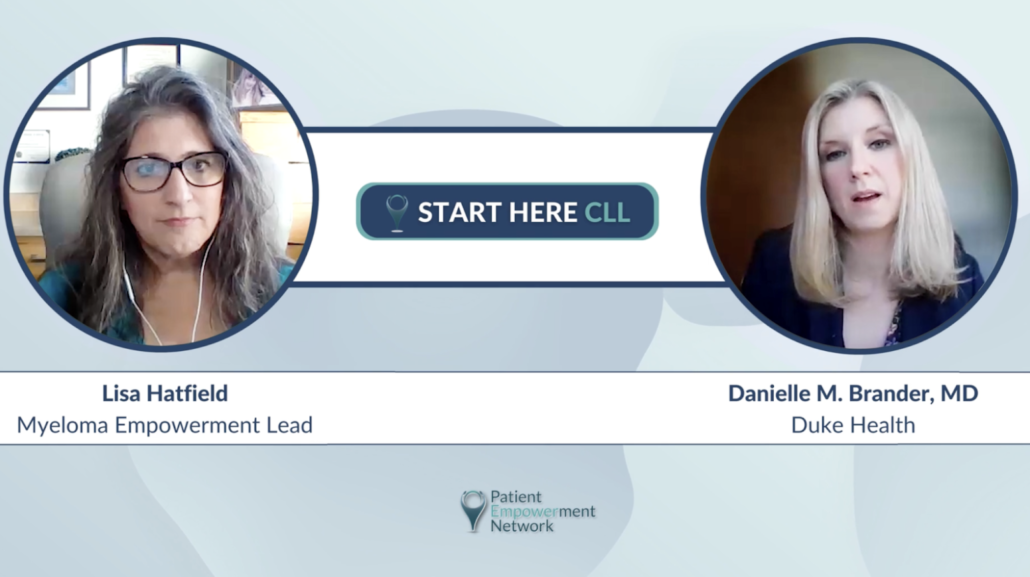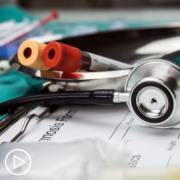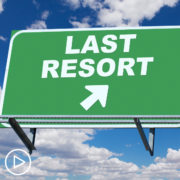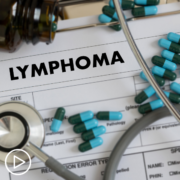Start Here: Bridging the CLL Expert and CLL Patient Voice
Chronic lymphocytic leukemia (CLL) can sometimes feel overwhelming and complicated, but what can patients and care partners do to help improve their care? With this question in mind, the Patient Empowerment Network initiated the START HERE CLL program, which aims to close the gap in the expert and patient voice to build empowerment.
START HERE CLL Program Resources
The program series includes the following resources:
- START HERE Patient-Expert Q&A Webinars with experts Dr. Ryan Jacobs and Dr. Danielle Brander moderated by Empowerment Lead, Lisa Hatfield.
- START HERE Library of resources has kicked off with a resource guide in both English and Spanish filled with CLL educational and support resources, along with expert tips.
- Your START HERE 90-Day Plan personalized with resources from PEN’s trusted advocacy partners.
- START HERE Activity Guide a downloadable, printable support resource packed with information and activities to educate, empower, and support CLL patients and care partners in their journeys through care.
- START HERE Text Alerts to receive personalized support from PEN Empowerment Leads.

Patient-Expert Q&A Webinar Topics and Key Takeaways
In the Patient-Expert Q&A webinars, CLL experts Dr. Ryan Jacobs from Levine Cancer Institute, and Dr. Danielle Brander from Duke Cancer Institute shared their expert knowledge to help patients and care partners fortify their knowledge and confidence. The webinars provided some in-depth discussion along with key takeaways derived from questions submitted by patients. Some of the discussion covered:
- Emerging CLL Research | Understanding the CAPTIVATE and MAJIC Studies
- IGHV-Mutated vs IGHV-Unmutated CLL | What’s the Difference?
- Concerned About CLL Watch and Wait? Start Here
- CLL & Relapse: A Look at Available Treatment Options
- CLL Genetic Markers: What Should I Ask About Prognostic Factors?
- CLL and BTK Inhibitor Treatment: What Are the Risk Factors?
- Can CLL Treatment Cause Gastrointestinal Side Effects?
- Is It Aging or My CLL?
- CLL and Vaccines | Vital Advice for Protecting Patients
- Are There Signs of Chronic Lymphocytic Leukemia Progression?
- How Can I Ensure My CLL Doesn’t Progress to Richter’s Transformation?
- Can Lifestyle or Supplements Impact CLL Treatment Response?
- BTK Inhibitor Treatment Side Effects | What CLL Patients Should Know
- START HERE CLL Resource Guide
- START HERE CLL Resource Guide en Español
Among some key points from the webinars, Lisa and Dr. Jacobs discussed the importance of genetic markers. Dr. Jacobs recommended CLL patients ask their doctor about their prognostic markers. “The one that is still potentially affecting outcomes, even with our novel treatments, are chromosome 17 aberrations, which stately are rare in the initial diagnostic setting, that or a TP53.”
The watch-and-wait phase of CLL, also called active surveillance, is a common term heard by CLL patients. However, there are actually two types of CLL. “While some CLL patients experience very gradual disease progression and are actively monitored during a watch-and-wait phase, other patients may experience a more expedited CLL progression and will need more frequent treatment.”
Treatment advancements for CLL have been moving forward over recent years. Dr. Brander shared her perspective about the advancements. “So over the last decade or even the last five years, for patients diagnosed with CLL, there’s been a very encouraging and marked change in the available treatments…not that many years ago we generally only had chemotherapy or chemotherapy combined with these antibody targeted treatments that we call immunotherapy sometimes. But in the last 5 to 10 years we’ve seen quite a remarkable change in treatments that target, meaning often they go after pathways or ways that the CLL cells have learned to grow or have learned to not die the way that normal cells should, die after certain time points.”
Vaccines for those with CLL have gathered more visibility in recent years with COVID-19. Dr. Jacobs addressed some questions about vaccination and shared, “I in general am recommending, as does the CDC, to get boosted every six months for patients with any level of immune suppression and having CLL qualifies you as that. And then I recommend all of the general vaccines that come with age, like, for example, the Shingrix vaccine for shingles is now safe to give to CLL patients because it’s a conjugate vaccine, it’s not a live virus vaccine. So we’re lucky now with just standard vaccines in the U.S., there are no live virus vaccines that the CLL patient has to worry about anymore, so I definitely encourage shingles, pneumonia vaccines, boosting for COVID. We’ll see if we get an RSV vaccine, that sounds like it’s on the horizon. Flu, of course.”
Worries about CLL progression are felt by many patients, and there are some ways to stay alert for warning signs. Expert Dr. Jacobs explained signs of CLL progression including new or worsened drenching night sweats, significant changes in a patient’s ability to function, and major changes in lymph nodes over a short period. Dr. Jacobs also shared some research updates for treatments that have shown success against progression to Richter’s transformation. “…I’ve been having some recent success using CAR T in those patients, and also now have a, I was thankfully getting it sort of off-label approval to do that, but now I actually have a clinical trial investigating axicabtagene ciloleucel (Yescarta) in those patients.”
Some CLL patients wonder about whether they can take a break from treatment. Dr. Brander addressed this question about BTK inhibitors. “…BTK inhibitors are given continuously, meaning, at least so far, the standard way we recommend of those treatments is that they’re taken every day, either once or twice a day, depending on which BTK inhibitor, and they’re taken every day. Unless patients run into progression, meaning the CLL learns to grow through its resistance or patients run into side effects that despite maybe team’s recommendation of changing the dose or holding the medications, that it’s just the medication is just not tolerate.”
Many CLL patients also wonder about the impact of exercise on their treatment response and their duration of treatment response. Dr. Brander explained about the impact of exercise. “I think certainly trials or studies really need to be continuing to look at this, because I think there likely are things that we can be more specific to patients about. There are studies looking at physical fitness and exercise regimens not necessarily specific to CLL, although there are studies being done in that space, but to other cancers showing that physical activity and exercise can help even for patients not on treatment maintain control of their cancer. So general daily activity and exercise are important in studies that look at how do you tailor that to an individual I think are important too.”
Whether patient fatigue is originating from CLL or from symptoms of old age can sometimes be difficult to determine. Dr. Jacobs shared some insight about fatigue. “Fatigue, I’m not as confident when that’s the only issue that a patient’s having. I try to differentiate between fatigue from other causes and old age, and specifically to CLL. They try to put it as a metric and say, if you’re having to spend half the day or more just lying around and you’re not able to do your normal activities of daily living, like that’s a severe level of fatigue and treatment should be considered. I’m looking for somewhat of a precipitous decline, not necessarily just kind of the gradual fatigue that you might more relate to aging.”
Some program participants provided valuable testimonials and insights on what they learned from the START HERE CLL Patient-Expert Q&A webinars:
Testimonials:
- “I love PEN webinars because I feel I have a direct connection with the best experts. I have many questions for my team after this program, thank you.”
- “This program was stellar. I learned a lot that I have to address with my doctor.”
- “I have a greater comfort level with promising treatment options.”
- “I was most interested in learning about treatment options for relapsed patients and Dr. Jacobs provided great information. THANK YOU!”
- “This was very helpful as I consider how to support my sister who has been diagnosed with CLL.”
Learnings:
- “What BTK and BCL-2 inhibitors are…How Fish looks for DNA for Leukemia cells. And how exercise can help any cancer patient. Thanks for the program!”
- “Even though I am Watch & Wait, I appreciated the information and explanation of the latest treatments.”
- “Fantastic program. Learned about many reasons docs decide not to treat.”
- “I learned about some potential treatment options should I relapse.”
Many other questions were raised during the CLL Patient-Expert Q&A webinars. We hope you can use these valuable CLL resources to build your knowledge and confidence toward becoming a more empowered patient or care partner.










